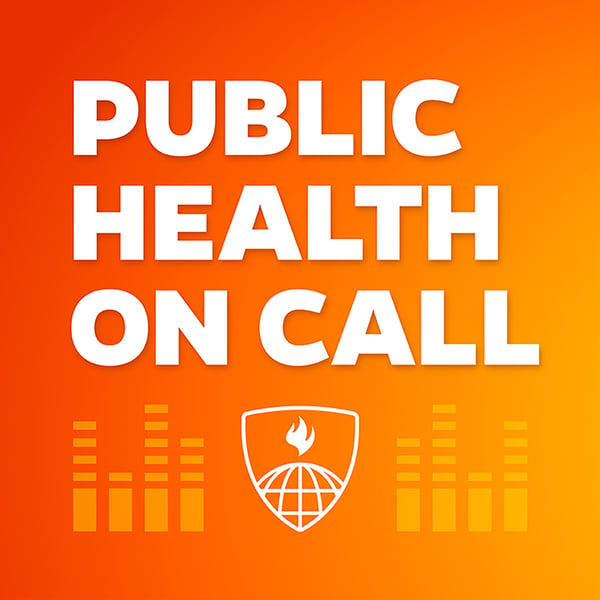863 - The NIH-Funded Autism Study Hoping to Pinpoint Gene-Environmental Interplay
Public Health On Call
The Johns Hopkins Bloomberg School of Public Health
4.8 • 620 Ratings
🗓️ 6 March 2025
⏱️ 15 minutes
🧾️ Download transcript
Summary
About this episode:
A large-scale, multi-country autism study involving more than 175,000 individuals is hoping to find interplay between genes and the environment that may influence autism diagnosis and symptoms. But proposed NIH funding cuts could imperil the study’s future. In this episode: A look at an NIH-funded study that hopes to improve the quality of life for people with autism and their caregivers, and find better tools for diagnosis and treatment.
Guests:
Christina Ladd-Acosta is the vice director at the Wendy Klag Center for Autism and Developmental Disabilities, and associate director for epigenomic analysis at the Environmental influences on Child Health Outcomes, Data Analysis Center (ECHO-DAC).
Heather Volk is an epidemiologist and professor of mental health at the Wendy Klag Center for Autism and Developmental Disabilities.
Host:
Stephanie Desmon, MA, is a former journalist, author, and the director of public relations and communications for the Johns Hopkins Center for Communication Programs, the largest center at the Johns Hopkins Bloomberg School of Public Health.
Show links and related content:
-
NIH funding makes large scale Johns Hopkins autism study possible—The Hub
-
Discovering How Environment Affects Autism—Hopkins Bloomberg Public Health Magazine
Contact us:
Have a question about something you heard? Looking for a transcript? Want to suggest a topic or guest? Contact us via email or visit our website.
Follow us:
-
Here's our RSS feed
Note: These podcasts are a conversation between the participants, and do not represent the position of Johns Hopkins University.
Transcript
Click on a timestamp to play from that location
| 0:00.0 | Welcome to Public Health On Call, a podcast from the Johns Hopkins Bloomberg School of Public Health, |
| 0:05.9 | where we bring evidence, experience, and perspective to make sense of today's leading health challenges. |
| 0:16.3 | If you have questions or ideas for us, please send an email to public health question at jhhhu.edu. |
| 0:23.8 | That's public health question at jhhu.edu for future podcast episodes. |
| 0:30.5 | Hi, it's Lindsay Smith Rogers. |
| 0:33.1 | Today, a look at why federal funding is key to research efforts through the eyes of two Johns Hopkins |
| 0:38.7 | researchers who've helped build mountains of data about genetic and environmental factors in autism. |
| 0:45.5 | Stephanie Desmond talks to Chris Lattacosta and Heather Volk about how they are on the precipice |
| 0:50.6 | of making discoveries that can improve the lives of those with autism and how important |
| 0:55.6 | NIH grants are to getting there. Let's listen. Heather Volk and Chris Ladd Acosta, thanks so much for |
| 1:02.2 | joining me. Thanks, Stephanie. We're excited to be here today. Thanks for having us, Stephanie. Of course. |
| 1:07.7 | And today I'd like to talk to you about the autism study that Johns Hopkins University |
| 1:12.6 | is part of, that you two are leading. Chris, can you tell me a little bit about it? Sure. The main goal |
| 1:19.7 | of our study is really to understand how both genes and the environment come together to influence |
| 1:25.9 | autism diagnostic symptoms, social communication and |
| 1:29.4 | behaviors, other kinds of mental and physical health conditions as well that individuals with |
| 1:35.3 | autism experience much more often than others. |
| 1:38.8 | And when we're talking about environment, when I use that term, we're really talking about lots of different |
| 1:46.4 | aspects of our lives, everything from the neighborhoods we live in and what the sort of |
| 1:51.8 | clean space or air quality might look like there to chemical kinds of exposures or chemicals |
| 1:57.1 | that are in our everyday kind of household products to pregnancy conditions and even diet |
| 2:03.8 | and different nutrients that we take in every day. There, could you just quickly tell me a little |
... |
Please login to see the full transcript.
Disclaimer: The podcast and artwork embedded on this page are from The Johns Hopkins Bloomberg School of Public Health, and are the property of its owner and not affiliated with or endorsed by Tapesearch.
Generated transcripts are the property of The Johns Hopkins Bloomberg School of Public Health and are distributed freely under the Fair Use doctrine. Transcripts generated by Tapesearch are not guaranteed to be accurate.
Copyright © Tapesearch 2025.

